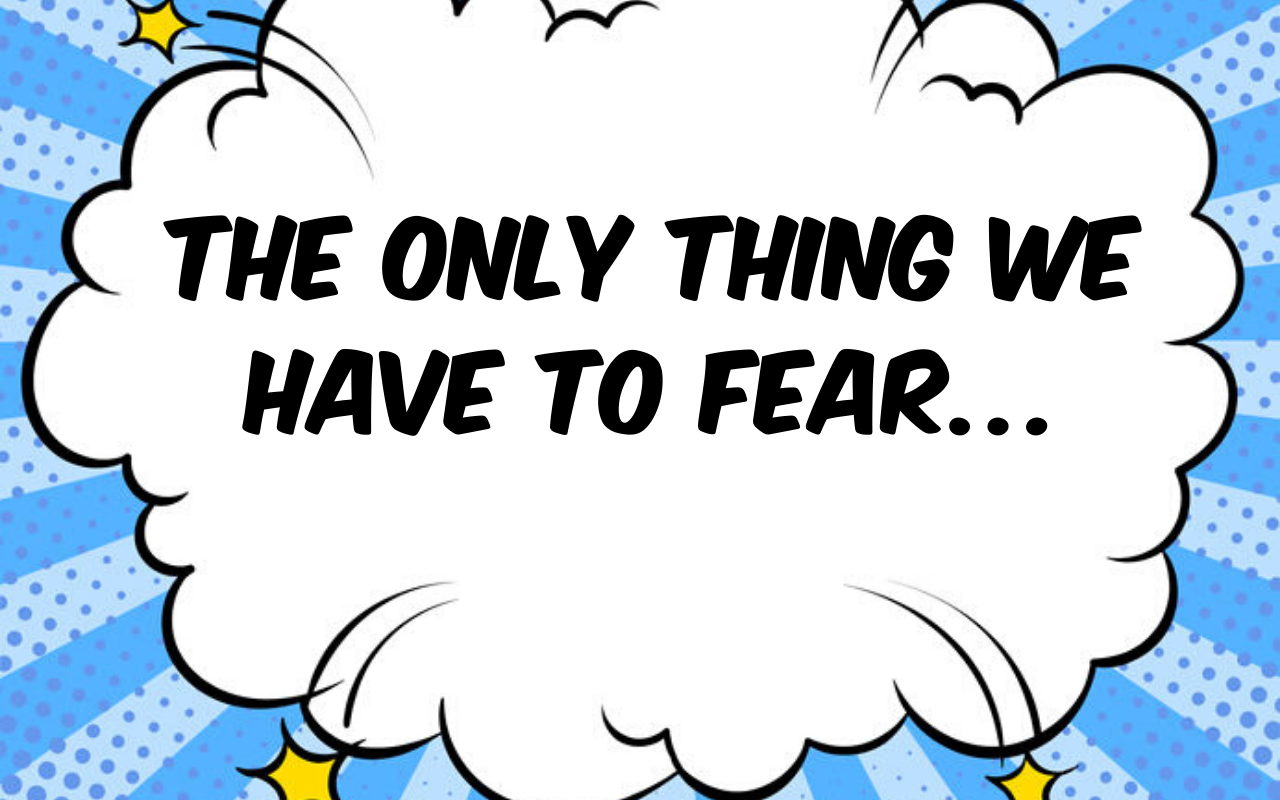It’s March 4, 1933. The Great Depression has been going for three-plus years, and is at its lowest point. People are terrified. Some say it’s the end of the United States, of the whole Western World.
A new US president, Franklin D. Roosevelt, steps up to the podium for his inaugural address. He was a change candidate and won by a landslide. Now he has to make good on the promise people voted for. What he says in this speech really matters.
The speech he gives is his famous “the only thing we have to fear is fear itself” speech. We’ve been quoting that phrase ever since whenever anything scary is happening.
What we seldom repeat is the rest of that sentence about fear itself:
…fear — nameless, unreasoning, unjustified terror which paralyzes needed efforts to convert retreat into advance.
That’s something we need now, while we face another frightening situation.
Because, like then, we’re in a bad situation. But bad as it is, there’s something else that could do a whole lot more damage than the situation itself…
It’s fear.
The bad decisions — or complete inaction — that come from fear can make a bad situation much, much worse.
And, sadly, we’re seeing that happen with nonprofits.
They try to raise funds, but they are so driven by fear, they can’t get it right. Not even close.
It goes something like this: they commission a committee of 17 people to group-write their fundraising piece. Probably no fundraising professionals on the committee (who needs them?) — just wall-to-wall VPs, with a few lawyers and accountants thrown in.
The committee chews on every word, settling on the least powerful one they can all agree on. Then they add clause after clause to each sentence to make sure every base, real and imagined, is covered. And they make sure nothing is vivid, or strong, or urgent.
The end product: Fundraising of such thundering incompetence that even in an urgent situation like the one we’re in, it raises a fraction of what it could.
Worse yet, they really cover their rear-ends by going completely silent.
They’re crippled with fear that something they say might cause some kind of terrible blow-back from donors. I don’t know what kind of fantasy scenario it might be. Maybe they imagine every single donor being disgusted by their daring to speak out loud during a crisis and walking away forever? A malpractice lawsuit? A violent uprising with torches and pitchforks?
Hide like a rabbit in a hole. Nobody will blame you for anything if you do that.
Except the go-silent approach guarantees years of financial pain, long after this crisis is over.
Neither approach should be acceptable. Ever. But especially now, when fundraising so urgently needs to be good!
Here’s what everyone in our sector needs to do: Cast out fear! We need fundraising heroes who act with courage right now. We need more courage right now, not less!
Here are some steps that can help you act more courageously:
- Dramatically scale back your approval process so it only has people who know what they’re doing — two or three at most! — and each one has a specifically defined area of knowledge about it.
- Choose action over inaction. It’s nearly always the right course.
- At every decision point, choose the bolder, reasonable alternative.
- Lead your leaders. They carry weight on their shoulders that often causes them to choose the way of fear. Help them be brave by being brave yourself. (And if they are unleadable, start planning your personal exit strategy.)
You will make mistakes. Everybody does. Fear doesn’t eliminate mistakes — it just adds to them.
I read somewhere that the Bible has the phrase “fear not” 365 times. I don’t know how accurate that is, but take it this way: Every day, don’t be afraid.
The book sci-fi classic Dune by Frank Herbert has a powerful litany against fear. It starts like this:
I must not fear.
Fear is the mind-killer.
Fear is the little-death that brings total obliteration.
This is a scary time. You have worries about your health, the health of your loved ones, the economic distress that’s hitting so many, the malfeasance of some political leaders.
But act with courage.
You’ll have better outcomes for yourself, your organization, and for all of us.
Another way to combat fear is to be part of a community of people who are facing the same things you are. You can find that by joining The Fundraisingology Lab, which offers one of the best Facebook communities in the world (just ask our members). Find out how to join here. Or check out our free Facebook community, the Smart Fundraisers Forum.
Related posts:











1 Comment. Leave new
Thank you Jeff Brooks! Your words are empowering — for each of us personally AND for every organization trying to add goodness into the world. I love to read whatever you write. Fear NOT — 365 days a year! You are so appreciated.